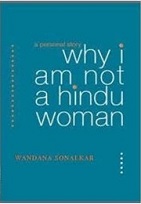| |
 |
Why I am not a hindu woman: a personal story Wandana Sonalkar Rs 350 Pb 2020 978-93-85606-31-1 All rights available Now Features on HT Picks
|
|
In a reasoned critique of Hindutva and Hinduism, feminist scholar and activist, Wandana Sonalkar outlines why she, born female and upper caste in Maharashtra, has repudiated her religious identity. Based on her personal experience, and on textual and empirical evidence, she offers an intimate account of caste practices, and argues that patriarchy and Brahminism are integral to Hinduism. As such, it is misogynist and casteist, and its exclusionary imperatives are essential to both its practice — and to Hindutva, which extends this imperative to Muslims. She reiterates that discrimination and inequality have been so internalised that their daily observance segues seamlessly into social interactions, thus crystallising and entrenching them deeply in society. “This layered political account weaves personal and public histories into a voyage of self-discovery. Wandana Sonalkar probes what it means to be a politically conscious Indian citizen — combining Marxism, feminism, and always, always, a deep awareness of caste. She describes our collective life in the present with a sharp political eye: tottering on the edge of Hindu majoritarian rule, guided by the exclusionary ideology of Hindutva, but also redeemed by everyday acts of resistance.” — Githa Hariharan “Experience, history, scholarship and ethical energy combine in this story of an exceptional life, exceptionally lived. It is also a brave autobiographical inquiry into what it means to be ‘upper’ caste and feminist during the turn of the 21st century decades.” — Susie Tharu
|
|
Wandana Sonalkar
Wandana Sonalkar was professor of women's and gender studies at the Tata Institute of Social Sciences, Mumbai. She is the translator of, among others,We Also Made History: Women in the Ambedkar Movement by Urimila Pawar & Meenakshi Moon, and of Memoirs of a Dalit Communist: The Many Worlds of R. B. More She writes regularly on gender and caste. |
|
|
|